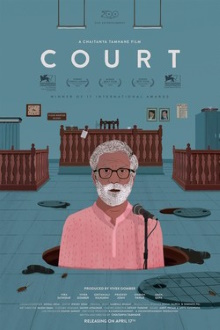We’d previously watched The Disciple by director Chaitanya Tamhane but I’d actually encountered his name before that. This older film was hard to find and so it took me until now to watch it. I’m very glad I persevered and kept it on my to watch list because this is one of the best films I’ve seen recently. Not only is this a revealingly honest depiction of the court system in India, it also provides a window into the lives of the people of different social classes who are embroiled in this case. I am simply in awe of the richness of the themes touched upon here and how it has so many moving parts and so many characters, yet everything fits together perfectly.
Narayan Kamble makes some money as a teacher but he is really an activist and a protest singer. His latest performance is interrupted when he is arrested by the police and human right lawyer Vinay Vora takes up his case. The charge is for abetting the suicide of a sewerage worker named Vasudev Pawar who died after climbing into a manhole and was overcome by the toxic gases inside. The police claim that that Kamble and his troupe performed in front of the deceased’s house two days before his death and sang a song encouraging sewerage workers to commit suicide. The case stretches for months while Kamble remains in prison as each hearing deals with only a specific matter as they wait for witnesses to become available or for the police to compile their reports. Eventually it becomes clear that he is prosecuted because the authorities consider him to be nuisance due to his political activism. In between hearings we see scenes of the lives of Vora who is well educated and comes from a rich family, as well as that of the public prosecutor Nutan, who is a middle class woman also raising two children.
This film makes use of the usual suite of tricks to make it more authentic: there’s no background music, there is no camera movement so it feels like we’re passive witnesses to real events, and most of the actors are non-professionals. It is so refreshing and satisfying to watch these scenes of ordinary life in present day India free of the exaggerated drama elsewhere. Meanwhile the court scenes help laymen like us to understand why trials unavoidably take so long. The police are undeniably being malicious in deciding to prosecute Kamble but after that it’s just a matter of letting the legal process play out and covering all of the bases. The judge handling the case actually comes across as being reasonably fair and competent so it’s not his fault or even that of the prosecutor that it takes so much time. I do note that this depiction is not perfectly accurate. In real life Indian prosecutors aren’t allowed to directly cross examine the accused and there are probably all kinds of other simplifications. Still, it’s as accurate a depiction of how the legal system works as we can reasonably hope to get.
My favorite part of the film however are the contrasting lives of the characters away from the court. Vora’s family is so wealthy that they own the entire apartment building they live in. He is so passionate about human rights that he is happy to set foot in the dingiest slums of Mumbai to help his clients and even uses his own money to pay their bail. Yet he also lives a luxurious lifestyle that is unattainable by his clients without shame in his own free time. Nutan lives a more ordinary life and even uses public transport to get to work and pick up her son from school. Yet her private life reveals that she holds profoundly illiberal values and thinks that troublemakers like Kamble should be imprisoned for 20 years. Meanwhile the poor widow of the deceased is just bewildered by everything that is going on and anxious that needing to go to court so often would impact her ability to work. There’s really so much going on here and I’m sure we’ve missed plenty due to cultural and linguistic barriers. For example, Nutan, Kamble and even the judge are able to understand one another in Marathi but Vora has to request that they speak either Hindi or English in court.
The upshot is that I like this far more than I did The Disciple. Not only am I more interested in the vagaries of the Indian judicial system than traditional Indian music, but it is so much denser in terms of information and sophistication. It even features low-key, clever jokes such as Vora’s talk being interrupted by someone bringing in a standing fan or his mother asking one of his clients about his love life. This is near perfect for me and I look forward to director Chaitanya Tamhane having a long and illustrious career.
